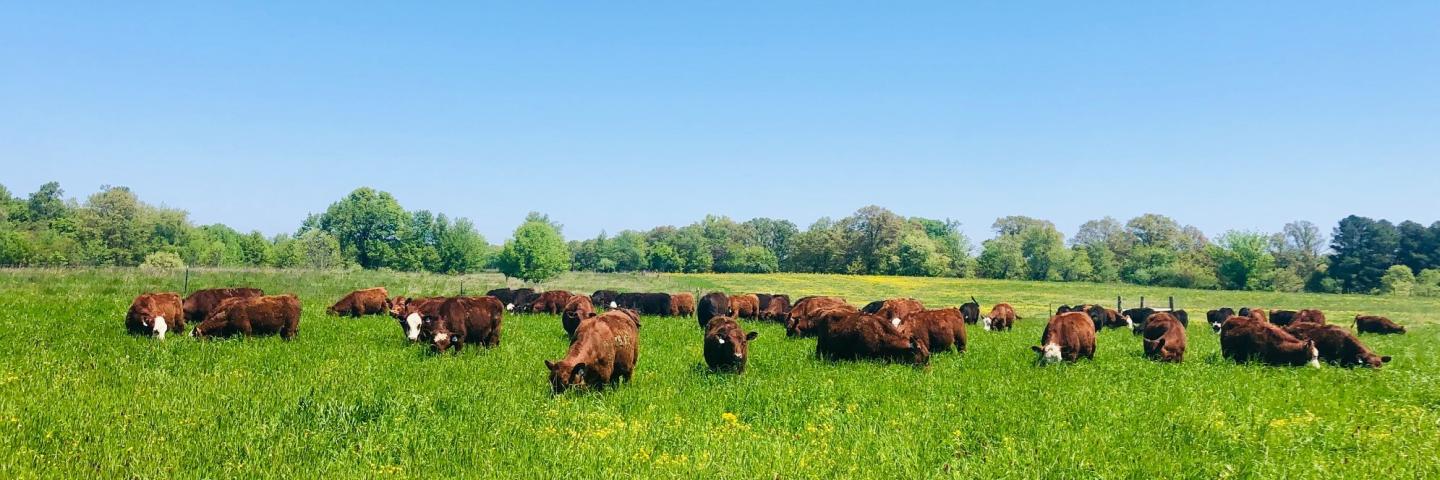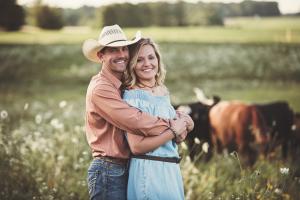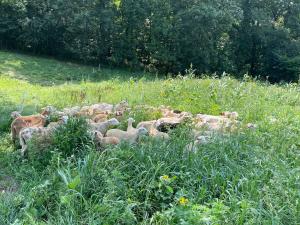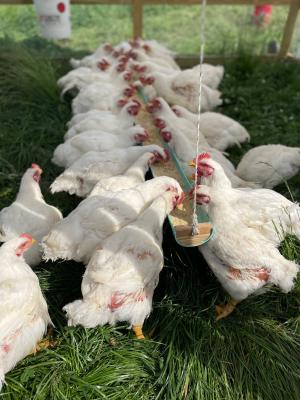
Meet Logan & Jessica Karcher from Dahlgren, IL. Learn from them how grazing different & diverse species can be successful.
LOGAN & JESSA KARCHER
Burnt Hill Cattle Company, LLC-Dahlgren, IL
Overview
Logan Karcher grew up on the land and always had an interest in livestock, raising cattle, and sheep since starting 4-H at an early age. His grandfather managed a cow-calf operation and grew corn, soybeans, and hay; he was one of the first farmers in the county to implement no-till practices. When he retired from the farm, the family enrolled a number of farmland acres in the Conservation Reserve Program (CRP), which pays farmers to take sensitive land out of agricultural production.

Logan studied at Murray State University in Kentucky and received an M.S. in agriculture with a focus on animal science and reproduction. While in school, he learned the ins and outs of regenerative practices like mob grazing and returned home committed to continuing his grandfather’s legacy of environmental stewardship and conservation.
Logan, his wife Jessa, and daughter Charlie now manage the fourth-generation family farm in the small community of Dahlgren in Hamilton County, Illinois. They raise grass-fed, grain-finished beef; grass-finished lamb; pastured pork and broilers; and honey on 80 total acres of pasture and woodlands. The Karchers are working to regenerate their land, bringing CRP acres back into production through conversion to high quality grazing pastures.
Adaptive Stewardship
Logan approaches farming with openness and curiosity and continues to seek out the latest information and resources on grazing. He cites Dr. Allen Williams and Mr. Greg Judy as two sources of inspiration and notes that it’s important to also connect with fellow graziers, “not only to bounce ideas off of but also to keep that competitive drive.”
The Karchers understand their role as active stewards of the land, saying, “We take great pride in our land and management. It all starts with a healthy, living soil.” Logan notes that their faith in God informs their regenerative outlook and plays a significant role in shaping their approach to stewardship: “We work to make the land the best it can be, to heal it, and to leave it better than we found it for the next generation.”

Logan and Jessa primarily sell meat through their farm’s Facebook page and at a local farm store. Facebook has been an important tool to engage customers, providing a platform to share information and resources about regenerative farming, build trust, and offer a transparent look into the day-to-day operations of the farm.
Logan plans to launch a website that will share the farm’s story and detail its approach. He sees consumer education as an integral part of his business, both to grow his customer base and build demand more broadly for regeneratively produced products. Logan and Jessa would like to eventually sell more of their products at their own farm store and sell less meat wholesale.
Grazing Species Diversity
Burnt Hill Cattle Co. is a multispecies operation, which is important for the ecological and financial resilience of the farm. A diversified operation results in more management flexibility and a larger customer base. Logan says customers often come for a specific product, like chicken, and leave with other products like bacon and steak.
Multispecies grazing also results in better utilization of forages. A third of the property is in timber and woodland, which Logan is gradually converting to an actively managed silvopasture.
Logan’s current rotation through the woodland acres starts with sheep, which strip graze through the undergrowth. Logan then introduces the pigs, which are given a short rotation. Finally, Logan follows the pigs with an annual seed mix. Several months later, the sheep rotate through again and graze annual cover crops.

Multispecies grazing is not without its challenges. Logan notes that each species requires a different management approach, and customers may need coaxing to try new products. But Burnt Hill customers see clear value in what Logan and Jessa provide. In a region dominated by conventional livestock production, the Karchers’ pastured, hormone and antibiotic-free beef, lamb, pork, and chicken products are especially popular. Lamb can be a harder sell, but Logan says once customers have tried it, they usually come back for more.
Growing Grazing
Logan says they’re looking to expand the operation and improve their forage quality, with the goal of finishing their beef on grass. Logan is currently bale-grazing on smaller, more marginal sections of pasture. This allows him to manage where manure and organic matter accumulate, providing fertility to the sections of pasture that need it most. Logan and Jessa both have jobs off-farm, but would like to eventually scale back their off-farm work to focus more on grazing management and improving their infrastructure.
Logan considered applying for cost share for initial water infrastructure on the farm through the Natural Resources Conservation Service (NRCS) Environmental Quality Incentives Program (EQIP). Because the scope of this initial installation was relatively small, he ended up purchasing the materials without cost share but would consider EQIP for larger projects in the future.
It’s also been challenging to find additional pasture in their area, which is dominated by conventional row crop agriculture. Logan sees this as a challenge not only to his own operation, but to expanding regenerative grazing in the region. He advises that graziers looking to expand look proactively for new grass but cautions that it does take time.
Logan also sees farmer education as a key component of growing interest in grazing. He feels there is a lack of understanding on regenerative grazing; farmers anticipate significantly more time spent on rotating cattle, but with the right system Logan says this is not the case. Under regenerative management, the Karchers halved their input costs due to improved soil, forage, and livestock quality.
Logan shared advice to prospective graziers: “Be patient! Focus on what your forages and soils are telling you, and never stop learning, reading, and trying new things.”
To learn more about Burnt Hill Cattle Company, LLC, visit their Facebook page or reach out to them via email at burnthillco@gmail.com.

